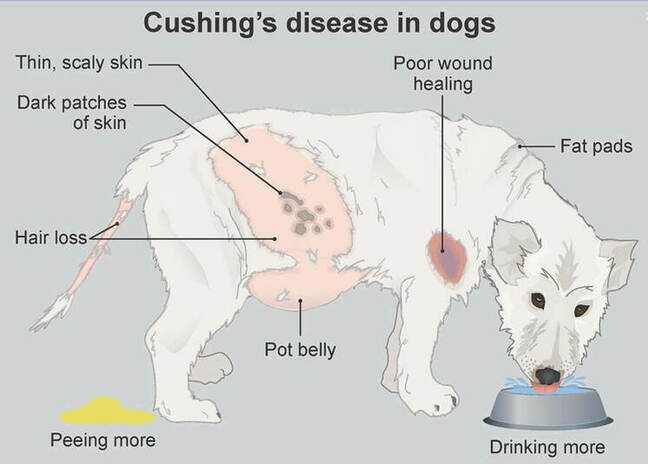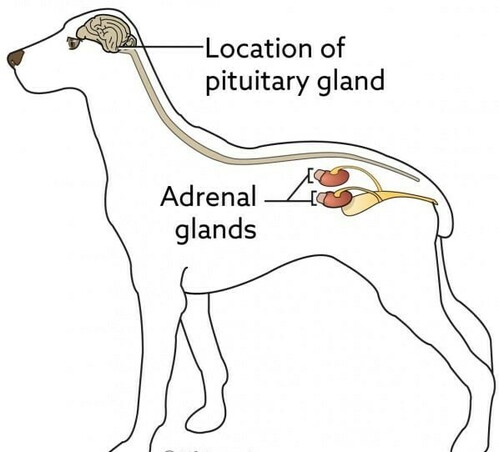Cushing’s Disease in Dogs
Are you concerned that your furry friend might have Cushing's disease? Let's chat about what it is, cover the key Cushing’s disease symptoms, and how it can affect your pet's health.
What is Cushing's Disease?
Cushing's Disease, also known as Hyperadrenocorticism, is when the adrenal glands produce excessive amounts of cortisone, resulting in many body systems being adversely affected by increased levels. It is the most common endocrine disease in dogs and is mainly seen in adult or old dogs. Any dog can develop Cushing's, but it is commonly seen in poodles, dachshunds, boxers, and terrier breeds. It is also a disease seen in horses.

What causes Cushing's in dogs?
Cushing's disease in dogs is caused by a benign or malignant tumour that grows on the pituitary gland, which is located at the brain's base. In rare cases, it can develop on the adrenal glands located at the top of the kidneys.
There can also be a similar effect called Iatrogenic Cushing's when an animal is given excessive and long-term amounts of steroids. This problem may cease after discontinuation of steroids, but it can take a while for the adrenal gland to produce cortisone again naturally. This is why people should wean their animals off cortisone gradually.
What happens to the body?
Cortisol is essential to life because it supports many body systems. With increased levels of cortisol, these systems develop functional disturbances that include:
- Gluconeogenic - converts glucose to glycogen to be stored in the liver and muscles, making the liver work harder.
- Lipolytic - which affects the breakdown of fats.
- Protein catabolic - which affects the breakdown of protein into amino acids.
- Increases in blood flowing to the kidney, more workload put on the kidney.
- Atrophy of the sebaceous glands and hair follicles causes alopecia.
- It also affects the anti-inflammatory process, suppressing the immune system and minimising the body's reaction to inflammation.
There are two types of Cushing's Disease in dogs:
- Pituitary-dependent hyperadrenocorticism (PDH) is due to a small benign tumour that forms on the pituitary gland in the brain. Pituitary-dependent cushing’s disease causes it to produce excessive amounts of adrenocorticotrophic hormone (ACTH). ACTH stimulates the adrenal glands to produce cortisone. When excessive amounts of ACTH are produced, excessive amounts of cortisone are released into the body. This is the most common form of the disease and accounts for 85% of dogs affected.
- Adrenal Dependent Cushing's Syndrome is where a tumour grows directly on the adrenal gland and can sometimes be malignant. No ACTH is produced with this form of the disease, but the same effect of overproduction of cortisone happens. It usually only affects one adrenal gland.

Cushing's Disease symptoms
Cushing's disease in dogs can cause a range of symptoms. Your pet may develop one or more of the following:
- Increased appetite
- Increased thirst
- Frequent urination
- Enlarged abdomen (potbellied)
- Loss of hair
- Thinning of the skin
- Panting
- Lethargic
- Recurrent urinary tract infections
What can you do naturally?
When it comes to your cat or dog’s Cushing’s disease, our Tagiwig range has the remedy Cush Rx, a homoeopathic blend designed to support your dog or cat's immune response to Cushing's Disease. Check the review tab to see how others have found our Cush Rx remedy for your pet. Pet owners can spend over $240 per month on vet treatments. Our Cush Rx remedy works out very economically at one and a half months for $27.50.
We also offer one-on-one consulting services, where we develop a plan for your pet that is individualised to their needs and symptoms.
Shop our Cushing’s Disease range for cats and dogs now!
FAQs
What breeds of dogs are more prone to developing Cushing"s Disease?
Studies show that any breed of dog can be affected by Cushing"s Disease. However, it is most likely to be found in poodles, dachshunds, boxers, and terrier breeds. These breeds are particularly susceptible to defects related to this condition. For instance, characteristic symptoms like hair loss and pot-bellied shape often appear with the disease in dogs of these specific types. As such, owners may want to take extra precautions when it comes to understanding how their particular breed is affected by Cushing's Disease in dogs.
How is Cushing"s Disease diagnosed in dogs?
Cushing"s Disease in dogs is typically diagnosed through a combination of blood tests, urine tests, and imaging studies such as X-rays, ultrasounds, or scans. Your vet may also perform an ACTH stimulation test or low-dose dexamethasone suppression test to confirm the diagnosis.
Can Cushing"s Disease be cured in dogs?
While there is no cure for Cushing"s Disease in dogs, it can be managed through natural remedies, dietary changes, and other supportive care measures. With proper management, many dogs can live happy and healthy lives with Cushing's Disease.
Recent Articles

20% Off
All Cat Remedies
Lorem Ipsum is simply dummy text of the printing and typesetting industry. Lorem Ipsum has been the industry's standard dummy text ever since the 1500s, when an unknown printer took a galley of type and scrambled it to make a type specimen book. Lorem ipsum dolor sit amet, consectetur adipiscing elit. Vivamus leo ante, consectetur sit amet vulputate vel, dapibus sit amet lectus.



 Earn loyalty points everytime you shop
Earn loyalty points everytime you shop
